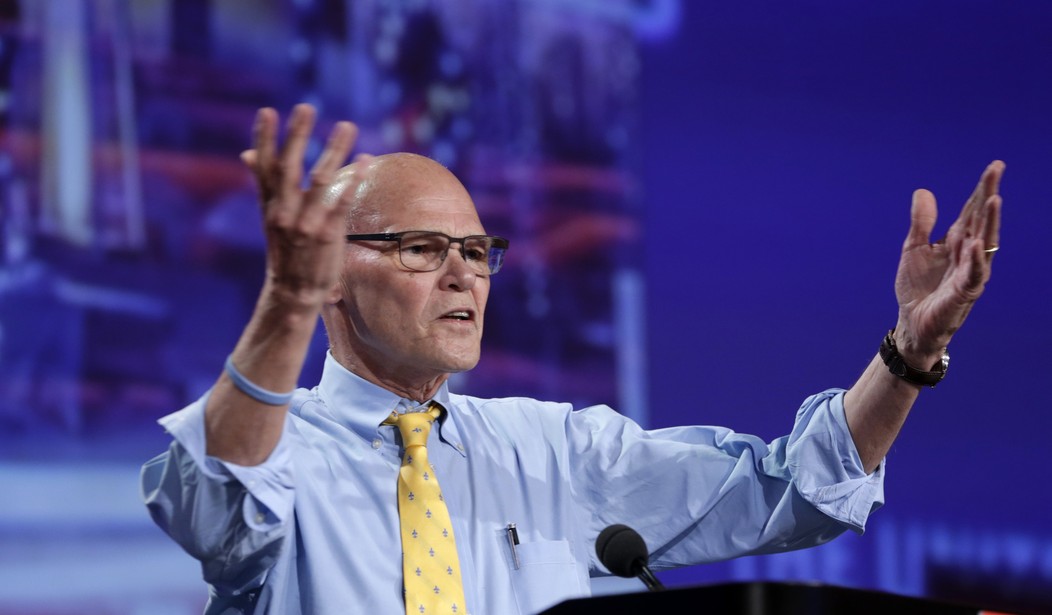Democratic strategist James Carville certainly has been in the news as of late with his memorable comments from last month during an interview with The New York Times' Maureen Dowd when it comes to there being "too many preachy females," leading to a feud with Rep. Alexandria Ocasio-Cortez (D-NY), after they've already been at odds for years now. Carville's had another memorable interview, this time with MSNBC, as he talked with Ari Melber.
The YouTube clip is titled "'Blowing it': GOP panics over Trump trial and fears that House chaos will topple another Speaker," but that's only one small part. Carville is worried for President Joe Biden's reelection campaign as well.
The segment started off by highlighting how Biden reunited with fellow Democratic presidents Barack Obama and Bill Clinton for a lavish fundraiser last Thursday in New York City. It's also worth highlighting the contrast of how former and potentially future President Donald Trump was on nearby Long Island to speak at the wake for NYPD officer Jonathan Diller who had just been murdered, with his accused killer having had 21 prior arrests.
Carville claimed that the event was "historic," adding he thinks "the party is starting to gel to come together" and "it's important for people to see some Democratic unity" here. While Carville and Melber laughed at how Trump's former Republican president, George W. Bush, wouldn't be seen with Trump, it still came off as a bit out of place in how Melber then immediately pivoted to discussing how Republicans aren't seen as unified with their infighting over whether to oust Speaker Mike Johnson (R-LA).
It was in the remaining moments of the segment that those particularly memorable remarks from Carville came about concerns with Biden and his polling. As he had previously told Melber, "we're not in an advantageous position" and "we're going to have a hard time replication the 2020 coalition." This is particularly with regards to those "under 30 and non-white." Thus, Carville shared, "for President Biden to come back to win this thing, we're going to have to do better with kind of 'middle voters,' swing voters."
Recommended
Carville shared he does think "the polling has gotten a little bit better," but again reminded "we're not going to replicate the 2020 coalition," speaking further on how "most people think we're going to lose Hispanic males" and how "young black males have become so disengaged from this process, and it's happened rapidly." Carville made clear "that's a great concern for me."
The clip ended on not the greatest note for the deeply unpopular incumbent president, as Carville offered that "President Biden could win the election," though he then spoke to how "but identifying with the party, in terms of as you go forward, the male detachment in the United States is a significant problem particularly among what we would call non-white males," as Carville also pointed out "and it's not just me."
As our sister site of Twitchy highlighted earlier on Monday, Carville also made similar remarks in a short clip that's been going around on Monday. While it may be April Fool's Day, the remarks are similar to what he said when talking to Melber, so it's no joke. They come from an edition of "Carville's Classroom" that was shared the night before, in a clip screaming about "What's At Stake If Donald Trump Wins."
"It's horrifying our numbers among young voters, particularly younger blacks. Younger Latinos... younger people of color. Particularly males. We're not shedding them, they're leaving in droves," Carville warned in that clip.
James Carville is scared of MAGA 24:
— Citizen Free Press (@CitizenFreePres) April 1, 2024
"It's horrifying our numbers among young voters, particularly younger Blacks. Younger latinos. Particularly males. We're not shedding them, they're leaving in droves." pic.twitter.com/vwZMfmY56Z
If Carville's concerned for Biden when it comes to the drop of support in non-white males, then there indeed looks to be a concern. As Carville also reminded, "it's not just [him]" saying so.
There have been several recent headlines on those concerns, including on Monday, with CNN writing that "Biden’s chances could hinge on turning out Black voters, but first the campaign has to reach them." Some others from recent weeks have included:
- "Could Biden’s problems with Black voters help Trump win?," published by The Washington Post on March 30
- "Black men are poised to take Trump to the White House. Biden insiders are worried," published by the Independent on March 29
- "Black voters and organizers in battleground states say they're anxious about enthusiasm for Biden," published by CBS News on March 28
- "Democrats' big vulnerability: Why they're losing Black, Hispanic voters," published by Axios on March 13
- "CBS News poll analysis: Who's voting for Biden, and who's voting for Trump?," published by CBS News on March 5
CNN actually did multiple pieces on non-white male voters, including one from March 28 on "The unexpected dynamic that could decide the Trump-Biden rematch."
As the piece began by mentioning, "Democrats have been growing increasingly anxious about public polls showing former President Donald Trump making unprecedented inroads among Black and Hispanic voters."
It had more telling news about Trump, Biden, and this demographic from there, with added emphasis:
Both national and battleground state public polls consistently show Trump, at this point, drawing more support from Black and Hispanic voters than any Republican nominee since at least 1960. When The New York Times/Siena College, NBC News, Wall Street Journal and CBS News/YouGov all released national polls a few days apart earlier this month, each of them found Trump winning from 20% to 28% of Black voters and 45% to 48% of Hispanic voters. That’s far more than the 12% of Black, and 32% of Hispanic, voters he won in 2020, according to the Edison Research exit polls conducted for a consortium of news organizations including CNN. (The Pew Validated Voters study found Trump winning slightly fewer Black, and slightly more Hispanic, voters in the 2020 election.) A CNBC poll released Tuesday showed Biden drawing just 57% of all voters of color, compared to 71% in the 2020 exit poll.
Polls in the key swing states are returning similar results. The CNN/SSRS polls released last week showed Biden drawing only 55% of all non-White voters in Michigan and 69% in Pennsylvania – down in each case from about 80% in 2020. Marist College polls released last week showed Biden winning three-fourths of Black voters in Georgia and about four-fifths in North Carolina, well below the roughly 9-in-10 exit polls showed him winning in each state last time. A recent Fox News Poll in Arizona showed Biden winning only about half of Hispanics there, down from over 3-in-5 in the 2020 exit poll. Biden won over 9-in-10 Black voters in Wisconsin according to the 2020 exit poll, but a compilation of the two most recent Marquette Law School polls in the state showed him holding only a little more than 6-in-10 of them.
Some Democratic pollsters who focus on voters of color question the size of the minority polling samples that produce these results and insist they do not find nearly this much erosion for Biden in their own polls. But others in the party acknowledge the trend of diminishing non-White support for Biden is real (even if they do not believe it is always as pronounced as these public polls find.)
...
Biden’s immediate challenges have compounded these long-term shifts. His numbers are especially weak among younger Hispanic and Black voters, a reflection of the president’s difficulty connecting with young voters of any race. Biden is “a poor fit generationally for a non-White electorate that skews young,” said Republican pollster Patrick Ruffini, author of “Party of the People,” a recent book on the GOP’s gains among non-White voters. “He’s the anti-Obama in his appeal to different segments of the Democratic electorate,” he added.
Inflation, analysts in both parties agree, has also disproportionately hurt Biden with Black and Hispanic voters, many of whom live paycheck to paycheck. And conservative analysts believe Biden is also being hurt because many non-White voters view Democrats as too liberal on cultural issues including LGBTQ rights, crime and even control of the border – although polls make clear a majority of non-White voters side with Democrats on other marquee social issues, particularly abortion and gun control.
...
[Cornell] Belcher and other Democratic operatives focusing on Black voters acknowledge that even if Trump’s vulnerabilities ultimately limit his African American support, frustration over high prices and a sense that Biden has not accomplished much for the community could still threaten him. “Really people are looking for an offramp because they feel the president hasn’t done enough, and that offramp is third-party candidates,” said Adrianne Shropshire, executive director of BlackPAC, a group that organizes Black voters. “That’s the thing [the Biden campaign] needs to really pay attention to.”
Curiously, Carville did not speak to Melber's question during last week's segment as to if Biden's hyperpartisan State of the Union address "changed anything" since they last spoke. It was perhaps because he wanted to focus on expanding upon his remarks from before that address, but it is an interesting question. This is especially as some tried to claim last week that the results of a recent Bloomberg/Morning Consult poll, where Biden looks to be tightening the race in some swing states, indicate the address had a positive affect.
However, a Yahoo News/YouGov poll from more closely following the address, found that Biden did not receive any bounce.
More recent headlines also continue to speak to how Biden's improving in the polls, though Trump still maintains a lead of +1 according to RealClearPolling, with 46.5 percent support to Biden's 45.5 percent.
























